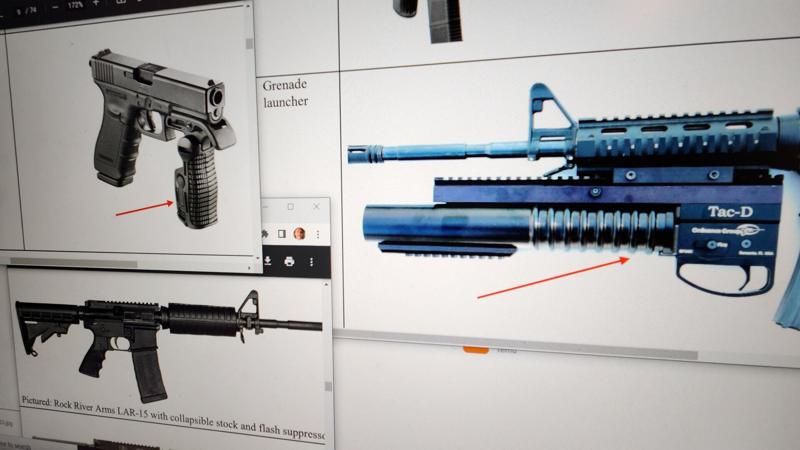(The Center Square) – The deadline for Illinois’ gun ban registry remains in effect after a federal judge denied an effort to delay the Jan. 1 date.
Federal Judge Stephen McGlynn granted the state’s motion to dismiss the preliminary actions but without prejudice, urging for the court to address the merits of the challenge.
Earlier this month in the Southern District of Illinois, McGlynn heard the case of Federal Firearms Licensees of Illinois and other groups seeking a temporary suspension of the state’s Jan. 1 deadline to register banned firearms to Illinois State Police.
In a ruling Friday, McGlynn denied the plaintiffs groups’ standing, and dismissed their due process and vagueness arguments against the gun ban registry. While denying the preliminary action to block the Jan. 1 deadline, McGlynn reasoned that such action “may also create further delays in this litigation when the constitutional rights of the citizens demand an expeditious resolution on the merits.”
Illinois banned the sale and possession of more than 170 semi-automatic firearms and magazines over certain capacities. The law included a registration for those who possessed banned items from before the Jan. 10, 2023 enactment date. Being found with unregistered banned items could lead to criminal penalties, including a Class 3 felony for the second and subsequent offense, after Jan. 1.
While their original case has already gone up to the appeals court on a preliminary injunction, FFL of Illinois and other plaintiffs amended their complaint back in the district court to argue due process violations. They wanted the Jan. 1 deadline to be delayed while the cases against the state law continue on their merits.
McGlynn on Friday noted the state’s argument against a preliminary injunction was because the plaintiffs are continuing appeals on the earlier question.
“[T]he Government argues that ‘the Seventh Circuit has already held that such a claim is unlikely to succeed on the merits,’” McGlynn writes.
Citing reporting from The Center Square, McGlynn said “the FFL Plaintiffs do not allege that specific individuals did not have notice of the requirements; they only argue that the Illinois government did not give adequate notice to the public as evidenced by the number of FOID cardholders who have filed endorsement affidavits.”
While McGlynn dismissed the due process claim and that the FFL and other plaintiffs lack standing, the court would address their arguments on the merits “in order to adequately develop the record.”
The Jan. 1 deadline “does not, by itself, cause criminal penalties to automatically attach and issue. Rather, the Government must prove that the individual in question ‘knowingly possess[es]’ the item in question,” the judge wrote.
On the vagueness arguments, the judge said the rules the state has published so far were not “unconstitutionally vague.”
“Rather, they are clear in what they prohibit, serious issues with the Second Amendment aside,” McGlynn said. “The Emergency Rules (and PICA, more generally) may well be unconstitutional as determined in this Court’s review on the merits. However, they are not vague … While they may very well be determined to be unconstitutional in an as-applied challenge on the merits and in in a trial setting after discovery has been completed, the FFL Plaintiffs cannot plausibly allege that they are facially void at this stage in litigation.”
McGlynn said he’s interpreting the Seventh Circuit U.S. Court of Appeals ruling in November reversing his initial preliminary injunction as directing “the lower courts to advance to merits review of all the claims.”
“This Court will expeditiously conduct a full review of the legal challenges to PICA on the merits,” McGlynn wrote. “This also points toward foregoing further preliminary wrangling and going straight to an exhaustive review of PICA and the Emergency Rules on the merits.”
In the weeks ahead, McGlynn noted things could develop.
“Additionally, Illinois FOID cardholders’ level of compliance with the registration scheme will be discernible within mere days,” he wrote. “This overall level of compliance will likely be highly relevant to the review of certain claims on the merits.”
McGlynn noted “[a]s of the date of this Order, 8,143 individuals out of 2,415,481 Illinois FOID cardholders (0.34%) have submitted affidavits.”
Friday’s ruling also had McGlynn discuss the role of government.
“Government exists to serve us, not lord over us,” McGlynn wrote. “The Constitution places limits on government’s power while guaranteeing freedom and liberty to the People. The Second Amendment guarantees are fundamental and belong to the citizens. The Second Amendment acknowledges a right of the People, not a license to be issued or denied by the government as it sees fit.”
Before issuing the order denying the plaintiffs preliminary injunction and granting the state’s motion to dismiss the notice and vagueness claims, McGlynn said on the merits, he will “endeavor to faithfully apply” previous U.S. Supreme Court precedent on the Second Amendment.
“Any entreaties to ignore, erode, or infringe the constitutional rights of the People will not gain traction in this Court,” McGlynn wrote.







